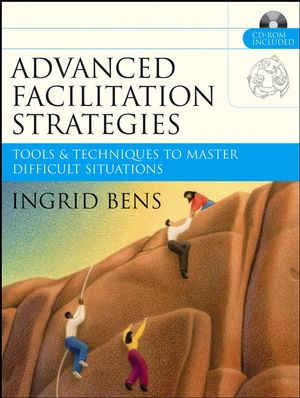Advanced Facilitation Strategies: Tools and Techniques to Master Difficult SituationsISBN: 978-0-7879-7730-6
Paperback
272 pages
August 2005, Jossey-Bass
 This is a Print-on-Demand title. It will be printed specifically to fill your order. Please allow an additional 10-15 days delivery time. The book is not returnable.
|
||||||
1. Advanced Strategies Overview.
Your Personal Philosophy of Facilitation.
The Three Levels of Competence.
Where Are You Now?—Self-Assessment.
The Power of Your Presence.
Personal Projection Assessment.
What is O.D.?
Working as a Consultant.
Two Forms of Consulting.
Expanding Your Power Base.
Gaining the Authority to Facilitate.
Losing the Facilitator Role.
Maintaining and Regaining the Role.
The Two Types of Interventions.
Deepening Your Process Responses.
Managing the Role of Leaders.
When the Boss is in the Room.
Enhancing Your Questioning Skills.
Asking Complex, High Quality Questions.
Advanced Facilitation in Action.
Advanced Skills Observation Sheet.
Debriefing Your Experience.
The Five Rules of Facilitation.
2. The Complexities of Decision Making.
Shifting Group Focus from “What” to “How”.
Decision Dilemma #1 – Lack of Clarity About Whether the Group Is Making Decisions.
Decision Dilemma #2 – Lack of Clarity About Empowerment.
Decision Dilemma #3 – Confusion About Which Decision-Making Method to Use.
Decision Dilemma #4 – Use of Positional Processes.
Decision Dilemma #5 – The Presence of Group Think.
Decision Dilemma #6 – Lack of Techniques to Overcome Blocks to Agreement.
Decision Dilemmas Summary Chart.
More on Decision-Making Options.
More on Compromise.
Overcoming Problems with Compromise.
More on Majority Voting.
Overcoming Problems with Majority Voting.
More on Multivoting.
Overcoming Problems with Multivoting.
More on Consensus Building.
Comparing Consensus and Consensus Building.
Overview of the Consensus-Building Process.
Overcoming Problems with Consensus Building.
Tools Overview.
The Decision-Making Roadmap.
Decision-Making Checklist.
Decision Effectiveness Exit Survey Elements.
Decision Effectiveness Survey.
3. Conflict Management Strategies.
Operating Under Mistaken Assumptions.
The Importance of Making Interventions.
Knowing When to Intervene.
Nine Ways to Intervene.
The Art of Positive Confrontation.
Monitor Your Self-Talk.
When Nothing Works!.
Conflict Senerios:.
1. Role Confusion – What’s a facilitator?
2. The Personal Attack – Who are you anyway?
3. Lack of Authority – You can’t facilitate me!
4. Unclear Meeting Goal – What’s this about?
5. Agenda Overload – We’re going to discuss all that!?!
6. Mistaken Assumptions – Who told you that?
7. Hidden Agendas – Wish we were talking about the real issues.
8. Resistance and Lack of Buy-in – What’s in it for me?
9. Resistance to Process – Don’t fence us in!
10. Lack of Norms – We don’t need rules!
11. Ignoring Group Norms – Oh those rules!
12. The Over-Participant – And furthermore . . .
13. The Under-Participant – I have nothing to add!
14. The Positional Debate – I’m right; you’re wrong!
15. The Joker – Aren’t I Funny!
16. Side-Chatters – Psst, Psst, Psst . . ..
17. Side-Trackers – On another note . . ..
18. Blocking – I simply won’t support this decision.
19. Unresolved Conflicts – This goes way back!
20. Cynicism – Why bother!
21. Sarcasm – This is typical of you!
22. Stuck – Are we still talking about that?
23. Conflict Erupts – Let me tell you how I really feel!
24. A Member Storms Out – I’m not listening to this!
25. Unwilling to Take Responsibility – I’m not doing it!
26. Losing Authority – Have I lost you?
27. Blocked Consensus – Why can’t we agree?
28. Lack of Closure – Let’s finish this later.
29. Lack of Feedback – Let’s talk later!
30. Lack of Follow-Through – Nothing ever happens!
4. Consulting Strategies for Facilitators.
Step 1: Assessment.
Question Development.
Sample Assessment Questions.
Checklist for Conducting Effective Interviews.
Identifying the Client.
Data Analysis Worksheet.
Step 2: Design.
Session Design Worksheet.
Session Design Components.
Session Design Template.
Design Checklist.
Step 3: Contracting.
Proposing a Process Design.
Dealing with Resistance.
Characteristics of a Strong Contract.
Sample Letter of Agreement.
Step 4: Implementation.
Starting a Facilitation.
During a Facilitation.
Ending a Facilitation.
Planning for Action.
Troubleshooting the Action Plans.
Step 5: Follow-up.
Monitoring and Evaluating Results.
Reporting on Progress.
Meeting Evaluation Form.
5. Essential Processes for Facilitators.
Strategic Planning.
Change Management.
Project Management.
Benchmarking.
Priority Setting.
Large Group Problem Solving.
Process Improvement.
Survey Feedback.
Win/Win Negotiation.
Customer Service Improvement.
Team Launch.
New Leader Integration.
Conflict Mediation.
Coaching.
References.
About the Author.
How to Use the Accompanying CD-ROM.



